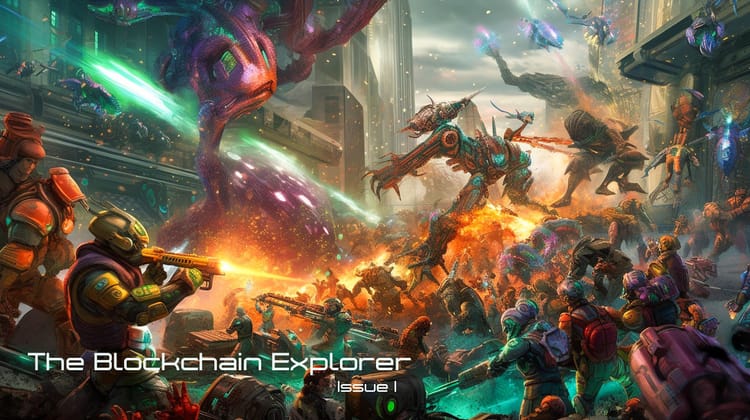Revolutionizing Ethereum: Unravel the Magic of Rollups for Unparalleled Scalability and Security!

Ethereum has long been the go-to platform for smart contracts and decentralized applications (DApps). However, it has faced challenges in scaling its transaction capacity and maintaining security. With Ethereum Rollups, these obstacles can be a thing of the past.
Boosting Ethereum's Transaction Capacity
Ethereum Rollups are layer 2 solutions that dramatically increase the network's transaction throughput. By bundling multiple transactions into a single rollup block, they reduce the amount of on-chain data while still ensuring the integrity and security of the transactions. This means that more transactions can be processed within the same timeframe, significantly improving Ethereum's scalability.
Enhancing Security with Data Availability Guarantees
A crucial aspect of Ethereum Rollups is their ability to provide data availability guarantees. In other words, they ensure that all the data necessary to validate a transaction is available on-chain, even if the transaction itself is processed off-chain. This feature is essential in maintaining the security and decentralization of the Ethereum network.
Reducing Network Congestion and Lowering Fees
By increasing transaction throughput and processing transactions off-chain, Ethereum Rollups help alleviate network congestion. This, in turn, leads to lower gas fees and a more efficient blockchain experience for users and developers alike.
The Different Flavors of Ethereum Rollups: zkRollups and Optimistic Rollups
There are two primary types of Ethereum Rollups: zkRollups and Optimistic Rollups. While both share the same goal of improving scalability and security, they achieve it through different means.
zkRollups: Empowering Ethereum with Zero-Knowledge Proofs
zkRollups rely on zero-knowledge proofs, a cryptographic technique that allows one party to prove the validity of a statement without revealing any additional information about it. This ensures that transactions are valid without requiring the entire network to process and verify them, thereby improving scalability and privacy.
Unraveling the Mystery of Zero-Knowledge Proofs
A zero-knowledge proof is a cryptographic method that allows a user to prove they have knowledge of a specific piece of information without actually revealing the information itself. In the context of zkRollups, this means that transaction data can be validated off-chain, with only the proof of validity submitted on-chain. This approach significantly reduces the amount of data that needs to be stored and processed on the Ethereum blockchain.
The Benefits of zkRollups: Privacy, Security, and Speed
zkRollups provide several advantages, including enhanced privacy, robust security, and faster transaction processing. The use of zero-knowledge proofs allows for private transactions, as sensitive data is kept off-chain. Moreover, zkRollups inherit the security properties of the Ethereum blockchain, ensuring that transactions remain tamper-proof. Finally, zkRollups offer near-instant transaction finality, as they don't require the same confirmation times as traditional on-chain transactions.
Optimistic Rollups: Betting on Fraud Proofs for a Scalable Ethereum
Optimistic Rollups use a different approach called fraud proofs to ensure transaction validity. In this model, transactions are assumed to be valid unless proven otherwise. If a fraudulent transaction
The Rollup Revolution: Decentralized Finance (DeFi) and NFTs Reimagined
Ethereum Rollups are transforming various sectors of the blockchain ecosystem, including Decentralized Finance (DeFi) and Non-Fungible Tokens (NFTs). Let's explore how Rollups revolutionize these areas and the pioneering projects leveraging this technology.
How Rollups are Transforming the DeFi Landscape
Decentralized Finance (DeFi) has been one of the most successful applications of blockchain technology, offering an alternative to traditional financial services. With Ethereum Rollups, DeFi platforms can significantly improve their scalability, allowing for more transactions, reduced fees, and overall better user experiences. As a result, Rollups are becoming a vital component of the DeFi infrastructure, powering platforms like Loopring and dYdX.
The Role of Rollups in the Thriving NFT Marketplace
The Non-Fungible Token (NFT) market has experienced explosive growth, with creators and collectors alike seeking to trade digital art, music, and other unique assets. Ethereum Rollups can enhance the NFT marketplace by enabling faster transactions and reducing costs, making it more accessible and efficient for users. Projects like Immutable X have already embraced Rollups to provide a scalable and gas-free NFT trading experience.
Pioneering Rollup-Based Projects to Watch Out For
The adoption of Ethereum Rollups is on the rise, with several innovative projects leveraging this technology. Keep an eye on these trailblazing platforms:
- Loopring: A zkRollup-based decentralized exchange offering high-speed, low-cost trading.
- dYdX: A powerful DeFi platform using Optimistic Rollups to provide scalable trading and lending services.
- Immutable X: A zero-gas NFT marketplace built on zkRollups, offering an eco-friendly and scalable solution for NFT trading.
- Arbitrum: Arbitrum is an Ethereum Layer 2 scaling solution designed to enhance the speed and efficiency of Ethereum transactions significantly. Developed by Offchain Labs, Arbitrum is capable of achieving up to 40,000 transactions per second (TPS), in contrast to Ethereum's 14 TPS, with significantly lower transaction costs. It leverages Optimistic Rollups, which bundle multiple transactions into a single one, accelerating processing times and reducing transaction costs. The platform operates a proprietary sidechain that gathers batches of transactions, settles them, and then submits the data back to the Ethereum blockchain. In addition to speed and cost advantages, Arbitrum is fully compatible with the Ethereum Virtual Machine (EVM), allowing Ethereum-based decentralized applications (dapps) to integrate with Arbitrum without needing modification. It offers the "AnyTrust Guarantee," which ensures that any transactions confirmed are valid, with validators staking ETH as a measure of their integrity.
Ethereum Rollups vs. Ethereum 2.0: Complementary Technologies for a Better Ecosystem
As Ethereum continues to evolve, it's essential to understand the relationship between Ethereum Rollups and Ethereum 2.0, and how these technologies will work together to create a more robust ecosystem.
Understanding the Goals of Ethereum 2.0 and Its Roadmap
Ethereum 2.0 is an ambitious multi-phase upgrade to the Ethereum network, aimed at addressing its current limitations and improving its scalability, security, and sustainability. Key components of Ethereum 2.0 include the shift to Proof of Stake (PoS) consensus mechanism and the introduction of shard chains to enhance the network's capacity further.
How Rollups and Ethereum 2.0 Will Work Together to Scale the Network
While Ethereum 2.0 aims to resolve the network's scalability issues, it's important to note that Rollups can provide immediate benefits by offloading transactions from the main chain. In fact, Rollups and Ethereum 2.0 are complementary technologies, with Rollups acting as a bridge to Ethereum 2.0's improved infrastructure. By combining the strengths of both Rollups and Ethereum 2.0, the Ethereum network can achieve even greater scalability and efficiency.
The Future of Ethereum with Rollups and Ethereum 2.0
As Ethereum continues to evolve, Rollups and Ethereum 2.0 will play a crucial role in shaping its future. Here's what you can expect from the synergies between these technologies:
- Massive Scalability: With Ethereum Rollups working alongside Ethereum 2.0, the network will be able to process thousands of transactions per second, fostering the growth of the DeFi and NFT ecosystems, as well as supporting the development of new blockchain applications.
- Reduced Fees: By leveraging the power of Rollups and Ethereum 2.0, the Ethereum network can significantly reduce gas fees and make transactions more affordable for users. This will enhance the overall user experience and make the platform more accessible to a wider audience.
- Greater Security and Decentralization: Rollups and Ethereum 2.0 both contribute to the security and decentralization of the Ethereum network. Rollups provide data availability guarantees, while Ethereum 2.0's shift to PoS consensus mechanism improves the network's security and reduces its reliance on energy-intensive mining.
- Interoperability and Flexibility: As the Ethereum ecosystem continues to expand, the combination of Rollups and Ethereum 2.0 will enable seamless interactions between various layer 1 and layer 2 solutions. This will promote greater interoperability and flexibility across the entire blockchain space.
In conclusion, Ethereum Rollups and Ethereum 2.0 are complementary technologies that will work hand-in-hand to create a more scalable, secure, and efficient blockchain ecosystem. By embracing these innovations, developers, and users can look forward to a brighter future for the Ethereum network and the world of decentralized applications.
Conclusion: Embracing the Power of Ethereum Rollups for a Decentralized Future
Ethereum Rollups are a groundbreaking innovation that has the potential to reshape the blockchain landscape. By addressing the long-standing issues of scalability and security, Rollups offer the promise of a more efficient, accessible, and powerful Ethereum network.
Both zkRollups and Optimistic Rollups have their unique advantages and use cases, each contributing to the growth and evolution of the Ethereum ecosystem. For instance, zkRollups, with their zero-knowledge proofs, bring enhanced privacy and speed to platforms such as Loopring and Immutable X, offering a secure and efficient environment for decentralized exchange and NFT trading. On the other hand, Optimistic Rollups leverage fraud proofs to provide a developer-friendly environment that supports greater throughput, as exemplified by projects like Arbitrum, dYdX, and Optimism, which deliver scalable blockchain, trading, and lending services.
Together with Ethereum 2.0, these Rollup technologies will play a critical role in shaping the future of the Ethereum network, enabling unprecedented levels of scalability, security, and efficiency.
Disclaimer
*The information and analysis provided in this article are intended for educational and informational purposes only and should not be considered as financial, investment, or professional advice. While our team strives to ensure the accuracy and reliability of the content, we make no representations or warranties of any kind, express or implied, about the completeness, accuracy, reliability, suitability, or availability of the information presented.
The content within this article may include opinions and forward-looking statements that involve risks and uncertainties. The blockchain and cryptocurrency markets are highly volatile, and past performance is not indicative of future results. Any reliance you place on the information presented is strictly at your own risk. Before making any investment decisions, we highly recommend consulting with a qualified financial advisor or conducting your own thorough research.
By accessing and using the information provided in this article, you acknowledge and agree that neither the authors, publishers, nor any other party involved in the creation or delivery of the content shall be held liable for any direct, indirect, incidental, consequential, or punitive damages, including but not limited to loss of profits, goodwill, or data, arising out of your use or inability to use the information provided or any actions you take based on the information contained within this section.*




